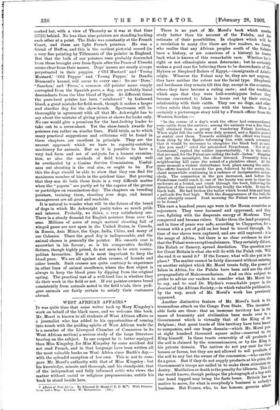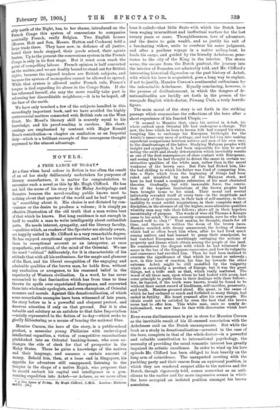WEST AFRICAN AFFAIRS.*
IT was quite time that sonae writer took up Mary Kingsley's work on behalf of the bra,ck races, and we welcome this book. Mr. Morel is known to all students of West African affairs as a journalist who has added to his opportunities of coming into touch with the guiding spirits of West African trade (be is a member of the Liverpool Chamber of Commerce in its West African section) •a serious study of the large literature ' bearing on the subject. In one respect he is better equipped than Miss Kingsley, for Miss Kingsley by some accident did not read French, and in that language have been written all
• the most valuable books on West Africa since Barth's day,- ' with the splendid exception of her own. This is not to com- pare Mr. Morel's authority with that of Miss Kingsley ; but his knowledge, minute and thorough, and his standpoint, that of the independent and fully informed critic who views the matter without racial or religious prepossessions, entitle his book to stand beside hers.
• Affairs of West Africa. By Edmund D. Morel (".E. D. M.") With Illustra- tions and a Map. London: W. Heinemann. [12s. .1 There is no part of Mr. Morel's book which merits study better • than his account of the Fulahs, and hie estimate of their possibilities. In chapters which will be
a revelation' to many (for there are few readers, we fancy,
who realise that any African peoples south of the Sahara have a history, or are conscious of a history) he trade back what is known of this remarkable race. Whether he is right or not ethnologists must determine ; but he certainly makes a good case for believing them to be descendants of the Hyksos or Shepherd Rulers of Egypt,—immigrants of Asiatic origin. Whoever the Fulani may be, they are not negroee; they have neither the colour nor the facial type. Shepherds and herdsmen they remain till this day, except in the countries where they have become a ruling caste; and the tradition which says that they were bull-worshippers before they became converted to Islam is borne out by their curious relationship with their cattle. They use no dogs, and other tribes relate that they converse with the beasts. Here is certainly a picturesque story told by a French officer from the Western Soudan :- " In the course of a day's work the officer had commandeered some cattle from the natives ; among the animals was a fine black bull obtained from a group of wandering Fulani herdsmen. When night fell the cattle were duly penned, and a Spahis posted as sentry over them. Towards midnight the officer was roused from sleep by the Spahis informing him with much solemnity that it would be necessary to slaughter the black bull at once. ' Are you mad ? ' cried the astonished Frenchman. Not at all Lieutenant,' replied the soldier imperturbably, ' it is the cattle that are mad, for the Fulani are calling the bull—listen.' Stepping out into the moonlight, the officer listened. Presently from a neighbouring hill came the sound of a plaintive chant. At the same moment a violent disturbance took place among the cattle. The officer hurried towards the pen, followed by the sentry, the chant meanwhile continuing in a cadence of inexpressible melan- choly. The commotion in the pen increased, and before the Frenchman could reach it, one of the beasts was seen to clear the enclosure at a bound, and crash through the bush, following the direction of the sound and bellowing loudly the while. It was the black bull. He had broken the halter which bound him and leapt a palisade five feet high. With the disappearance of the bnlithe chant abruptly ceased. Next morning the Fulani were nowhere to be found."
This race a hundred years ago were in the Hausa countries as sojourners. They were harassed and oppressed, and they rose, fighting with the desperate energy of Moslems. They conquered and became rulers. Under them the land prospered, and in time of peace was safe, according to Clapperton, for a woman with a pot of gold on her head to travel through. In time of war slaves were captured, and are still captured : it is the usage of Africa; but there is no clear evidence to show
that the Fulani were exceptional sinners. They certainly did not,
like Rabah or Samory, spread desolation. The question now for Great Britain is what she will do with the Fulah rule. Will
she end it or mend it ? If the former, what will she put in its
place P The matter cannot be fairly discussed without entering on another subject which Mr. Morel treats fully, the power of Islam in Africa, for the Fulahs have been and are the chief propagandists' of Mahommedanism. And on this subject we prefer to advise our readers to consider what Mr. Morel has to say, and to read Dr. Blyden's remarkable paper in the Journal of the African Society,—in which valuable publication, by the way, much of Mr. Morel's work has previously
appeared.
Another distinctive feature of Mr. Morel's book is his tremendous attack on the Congo Free State. The incontest• able facts are these : that an immense territory has in the name of humanity and civilisation been made over to Government which is virtually that of the King of the Belgians ; that great tracts of this territory have been leased to companies, and one huge domain—which Mr. Morel puts at eight hundred thousand square miles—reserved to the King himself. In these tracts ownership of all products of the soil is claimed by the concessionaires, or by the King is his private domain. The natives do not pay rent for their
houses or farms, but they are not allowed to sell products of the soil to any but the owner of the concession,—who cauthus
fix a price. But if they do not supply products at his price, the Government's troops are called in to make them stimulate in. dustry. Mutilation or death is the penalty for idleness. This all the world knows, though perhaps the photograph of a boy with one hand lopped may bring the facts home. Britain has no motive to move, for what is everybody's business is nobodYs
business. But France, who, to her honour, governs adnur* ably north of the Bight, has, to her shame, introduced on the French Congo this system of concessions to companies nominally French, really Belgian. Two English houses (Messrs. Holt and Son, Messrs. Hatton and Cookson) held a large trade there. They have now, in defiance of all justice, found their trade stopped, their goods seized, their agents beaten. Up to the present the concessions system in the French Congo is only in its first stage. But it must soon reach the point of compelling labour. French opinion is half converted on the matter, and we are doubly bound to stand out for British rights, because the injured traders are British subjects, and because the system of monopolies cannot be allowed to spread. While that system is allowed under French rule, France's tongue is tied regarding its abuse in the Congo State. If she has reformed herself, she may the more readily take part in reforming her discreditable neighbour,—it is to be hoped, off the face of the earth.
We have only touched a few of the subjects handled in this exceedingly important book, and we have avoided the highly controversial matters connected with British rule on the West Coast. Mr. Morel's literary skill is scarcely equal to his knowledge, and his proof-reading is careless. His short- comings are emphasised by contrast with Major Ronald Ross's contribution—a chapter on sanitation as an Imperial duty—which is a brilliant example of fine courageous thought expressed to the utmost advantage.











































 Previous page
Previous page